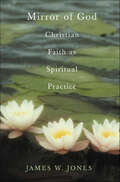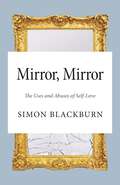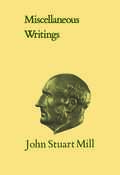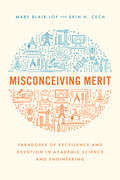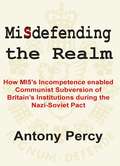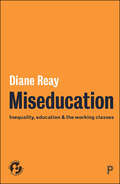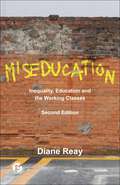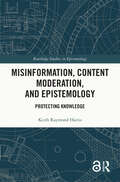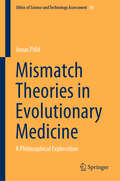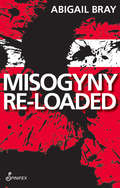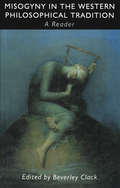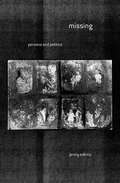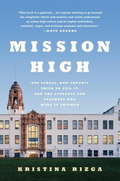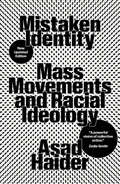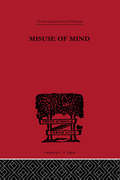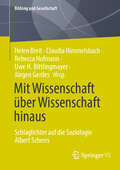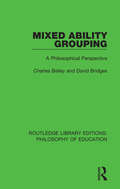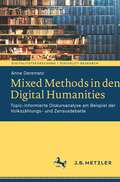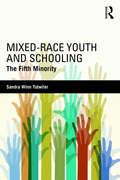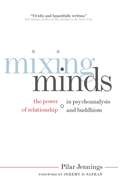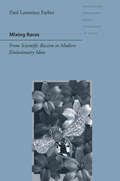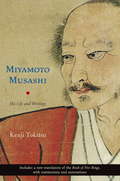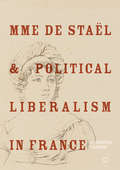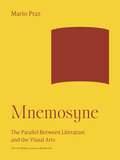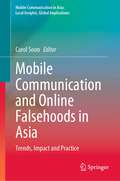- Table View
- List View
Mirror of God: Christian Faith as Spiritual Practice
by James W. JonesWhat are the benefits of being a spiritual person? This is the question that James Jones explores in his newest book, The Mirror of God. Jones contends that true religious belief is not a passive process and that one must work hard towards believing in God through acts such as prayer, meditation and communal worship. He explores the boundaries between psychotherapy and religious practice, looks at what Christians might learn from Buddhists and shows their effects on the body and mind. Jones is a psychologist as well as a professor of religion and, ultimately, he provides a blueprint for worship that's smart, effective and grounded in the real lives we all live.
Mirror, Mirror: The Uses and Abuses of Self-Love
by Simon BlackburnFrom the author of Think, an enlightening and entertaining exploration of narcissism and self-esteemEveryone deplores narcissism, especially in others. The vain are by turns annoying or absurd, offending us whether they are blissfully oblivious or proudly aware of their behavior. But are narcissism and vanity really as bad as they seem? Can we avoid them even if we try? In Mirror, Mirror, Simon Blackburn, the author of such best-selling philosophy books as Think, Being Good, and Lust, says that narcissism, vanity, pride, and self-esteem are more complex than they first appear and have innumerable good and bad forms. Drawing on philosophy, psychology, literature, history, and popular culture, Blackburn offers an enlightening and entertaining exploration of self-love, from the myth of Narcissus and the Christian story of the Fall to today's self-esteem industry.A sparkling mixture of learning, humor, and style, Mirror, Mirror examines what great thinkers have said about self-love—from Aristotle, Cicero, and Erasmus to Rousseau, Adam Smith, Kant, and Iris Murdoch. It considers today’s "me"-related obsessions, such as the “selfie,” plastic surgery, and cosmetic enhancements, and reflects on connected phenomena such as the fatal commodification of social life and the tragic overconfidence of George W. Bush and Tony Blair. Ultimately, Mirror, Mirror shows why self-regard is a necessary and healthy part of life. But it also suggests that we have lost the ability to distinguish—let alone strike a balance—between good and bad forms of self-concern.
Miscellaneous Writings
by John Stuart Mill John RobsonThe interests and activities of John Stuart Mill (1806-73) were so wide-ranging that even the varied subjects of thirty previously published volumes of Collected Works cannot encompass them all. In this volume are brought together diverse and interesting instances of his polymathic career, none before republished and some previously unpublished.Neatly framing Mill's writing career are his editorial prefaces and extensive notes to Jeremy Bentham;s Rationale of Judicial Evidence (1827) and James Mill's Analysis of the Phenomena of the Human Mind (1869). Both demonstrate his extraordinary powers of mind and diligence as well as his fealty. His constant avocation, field botany, is shown in his botanical writings, which open a window on an almost unknown activity that sustained and delighted him. Brief comments on two medical works hint at another interest. Two articles of which he was co-author demonstrate his work as editor of the London and Westminster Review, and a calendar of his contributions to the Political Economy Club provides yet another glimpse into his chosen activities and concerns. Published for the first time are Mill's English and French wills, providing still further biographical detail.
Misconceiving Merit: Paradoxes of Excellence and Devotion in Academic Science and Engineering
by Mary Blair-Loy Erin A. CechAn incisive study showing how cultural ideas of merit in academic science produce unfair and unequal outcomes. In Misconceiving Merit, sociologists Mary Blair-Loy and Erin A. Cech uncover the cultural foundations of a paradox. On one hand, academic science, engineering, and math revere meritocracy, a system that recognizes and rewards those with the greatest talent and dedication. At the same time, women and some racial and sexual minorities remain underrepresented and often feel unwelcome and devalued in STEM. How can academic science, which so highly values meritocracy and objectivity, produce these unequal outcomes? Blair-Loy and Cech studied more than five hundred STEM professors at a top research university to reveal how unequal and unfair outcomes can emerge alongside commitments to objectivity and excellence. The authors find that academic STEM harbors dominant cultural beliefs that not only perpetuate the mistreatment of scientists from underrepresented groups but hinder innovation. Underrepresented groups are often seen as less fully embodying merit compared to equally productive white and Asian heterosexual men, and the negative consequences of this misjudgment persist regardless of professors’ actual academic productivity. Misconceiving Merit is filled with insights for higher education administrators working toward greater equity as well as for scientists and engineers striving to change entrenched patterns of inequality in STEM.
Misdefending The Realm: How Mi5's Incompetence Enabled Communist Subversion Of Britain's Institutions During The Nazi-soviet Pact
by Antony PercyWhen, early in 1940, an important Soviet defector provided hints to British Intelligence about spies within the country's institutions, MI5's report was intercepted by a Soviet agent in the Home Office. She alerted her sometime lover, Isaiah Berlin, and Berlin's friend, Guy Burgess, whereupon the pair initiated a rapid counter-attack. Burgess contrived a reason for the two of them to visit the Soviet Union, which was then an ally of Nazi Germany, in order to alert his bosses of the threat and protect the infamous 'Cambridge Spies'. The story of this extraordinary escapade, hitherto ignored by the historians, lies at the heart of a thorough and scholarly expose of MI5's constitutional inability to resist communist infiltration of Britain's corridors of power and its later attempt to cover up its negligence. Guy Burgess's involvement in intelligence during WWII has been conveniently airbrushed out of existence in the official histories and the activities of his collaborator, Isaiah Berlin, disclosed in the latter's letters, have been strangely ignored by historians. Yet Burgess, fortified by the generous view of Marxism emanating from Oxbridge, contrived to effect a change in culture in MI5, whereby the established expert in communist counter-espionage was sidelined and Burgess's cronies were recruited into the Security Service itself.Using the threat of a Nazi Fifth Column as a diversion, Burgess succeeded in minimising the communist threat and placing Red sympathisers elsewhere in government. The outcome of this strategy was far-reaching. When the Soviet Union was invaded by Hitler's troops in June 1941, Churchill declared his support for Stalin in defeating the Nazi aggressor. But British policy-makers had all too quickly forgotten that the Communists would still be an enduring threat when the war was won and appeasement of Hitler was quickly replaced by appeasement of Stalin. Moreover, an indulgence towards communist scientists meant that the atom secrets shared by the US and the UK were betrayed. When this espionage was detected, MI5's officers engaged in an extensive cover-up to conceal their misdeeds. Exploiting recently declassified material and a broad range of historical and biographical sources, Antony Percy reveals that MI5 showed an embarrassing lack of leadership, discipline and tradecraft in its mission of `Defending the Realm'. This book will be of interest to all students of history, international relations, espionage and civil, national and international security.
Miseducation: Inequality, Education and the Working Classes (21st Century Standpoints)
by Diane ReayIn this book Diane Reay, herself working class turned Cambridge professor, brings Brian Jackson and Dennis Marsden’s pioneering Education and the Working Class from 1962 up to date for the 21st century.Drawing on over 500 interviews, the book, part of the 21st Century Standpoints series published in association with the British Sociological Association, includes rich, vivid stories from working class children and young people. It looks at class identity, the inadequate sticking plaster of social mobility, and the effects of wider economic and social class relationships on working class educational experiences.The book addresses the urgent question of why the working classes are still faring so much worse than the upper and middle classes in education. It reveals how we have ended up with an educational system that still educates the different social classes in fundamentally different ways, and vitally – what we can do to achieve a fairer system.
Miseducation: Inequality, Education and the Working Classes (21st Century Standpoints)
by Diane ReayEducation is supposed to level the playing field, and yet for many working-class children inequalities in the classroom in fact deepen the divide. Students from disadvantaged backgrounds are almost four times more likely to be excluded from school than their wealthier peers and many are struggling in an educational environment increasingly concerned with discipline. In this substantially revised and updated edition of her bestselling book, Diane Reay – herself working class turned Cambridge professor – investigates why we educate social classes so differently. Drawing on extensive interviews with working class children and young people, Miseducation offers a sharp critique of how class identity, social mobility, and entrenched inequalities shape educational outcomes. It also examines the increasing focus on control and discipline in UK schools and charts the impact of policies like academies on working-class students. In a new chapter, Reay draws lessons from educational systems around the world, while a second presents clear recommendations for creating a system that supports every child’s potential. Insightful and thought-provoking, this book is essential reading for anyone invested in the future of education and social equity.
Misinformation, Content Moderation, and Epistemology: Protecting Knowledge (Routledge Studies in Epistemology)
by Keith Raymond HarrisThis book argues that misinformation poses a multifaceted threat to knowledge, while arguing that some forms of content moderation risk exacerbating these threats. It proposes alternative forms of content moderation that aim to address this complexity while enhancing human epistemic agency.The proliferation of fake news, false conspiracy theories, and other forms of misinformation on the internet and especially social media is widely recognized as a threat to individual knowledge and, consequently, to collective deliberation and democracy itself. This book argues that misinformation presents a three-pronged threat to knowledge. While researchers often focus on the role of misinformation in causing false beliefs, this deceptive potential of misinformation exists alongside the potential to suppress trust and to distort the perception of evidence. Recognizing the multifaceted nature of this threat is essential to the development of effective measures to mitigate the harms associated with misinformation. The book weaves together work in analytic epistemology with emerging empirical work in other disciplines to offer novel insights into the threats posed by misinformation. Additionally, it breaks new ground by systematically assessing different forms of content moderation from the perspective of epistemology.Misinformation, Content Moderation, and Epistemology will appeal to philosophers working in applied and social epistemology, as well as scholars and advanced students in disciplines such as communication studies, political science, and social psychology who are researching misinformation.The Introduction and Chapter 1 of this book are freely available as downloadable Open Access PDFs at http://www.taylorfrancis.com under a Creative Commons Attribution-Non Commercial-No Derivatives (CC-BY- NC- ND) 4.0 license.
Mismatch Theories in Evolutionary Medicine: A Philosophical Exploration (Ethics of Science and Technology Assessment #30)
by Jonas PöldThis book investigates the limits and possibilities of mismatch theories in evolutionary medicine, a topic that has not yet received much attention in philosophy. Mismatch explanations are part of a broader attempt to establish evolutionary thinking as a foundation for human medicine. Although mismatch explanations are well-established in ecology to account for extinction risks, the ongoing attempts to transfer them into human medical contexts are riddled with conceptual and ethical problems. This book offers a comprehensive analysis of the theoretical presuppositions as well as the normative implications associated with mismatch theorizing in evolutionary medicine
Misogyny Re-Loaded
by Abigail BrayBlending personal experience with rigorous study, this explosive manifesto rails against what it presents as the resurgent sexual fascism of the new world order. By exposing everything from the casual acceptance of snuff pornography in "gore" culture to the framing of rape as a punch line, Abigail Bray links the celebration of sexual sadism to the rise of an authoritarian culture of militarized violence. Arguing that a meaningful collective resistance has been undermined by the mass destruction of genuine social and economic security for ordinary women, Misogyny Re-loaded presents a scathing critique of a politically convenient, billionaire-friendly, mainstream brand of feminism. Drawing on a wide range of resources from popular culture, literature, economics, psychiatry, psychology, philosophy, and environmental science, this book offers a warning about the growing social and environmental threat of an out-of-control military industrial complex.
Misogyny in the Western Philosophical Tradition: A Reader
by Beverley ClackFirst published in 1999. Routledge is an imprint of Taylor & Francis, an informa company.
Missing: Persons and Politics
by Jenny EdkinsStories of the missing offer profound insights into the tension between how political systems see us and how we see each other. The search for people who go missing as a result of war, political violence, genocide, or natural disaster reveals how forms of governance that objectify the person are challenged. Contemporary political systems treat persons instrumentally, as objects to be administered rather than as singular beings: the apparatus of government recognizes categories, not people. In contrast, relatives of the missing demand that authorities focus on a particular person: families and friends are looking for someone who to them is unique and irreplaceable. In Missing, Jenny Edkins highlights stories from a range of circumstances that shed light on this critical tension: the aftermath of World War II, when millions in Europe were displaced; the period following the fall of the World Trade Center towers in Manhattan in 2001 and the bombings in London in 2005; searches for military personnel missing in action; the thousands of political "disappearances" in Latin America; and in more quotidian circumstances where people walk out on their families and disappear of their own volition. When someone goes missing we often find that we didn’t know them as well as we thought: there is a sense in which we are "missing" even to our nearest and dearest and even when we are present, not absent. In this thought-provoking book, Edkins investigates what this more profound "missingness" might mean in political terms.
Mission High: One School, How Experts Tried to Fail It, and the Students and Teachers Who Made It Triumph
by Kristina Rizga"This book is a godsend . . . a moving portrait for anyone wanting to go beyond the simplified labels and metrics and really understand an urban high school, and its highly individual, resilient, eager and brilliant students and educators. ” --Dave Eggers, co-founder, 826 National and ScholarMatch Darrell is a reflective, brilliant young man, who never thought of himself as a good student. He always struggled with his reading and writing skills. Darrell’s father, a single parent, couldn't afford private tutors. By the end of middle school, Darrell’s grades and his confidence were at an all time low. Then everything changed. When education journalist Kristina Rizga first met Darrell at Mission High School, he was taking AP calculus class, writing a ten-page research paper, and had received several college acceptance letters. And Darrell was not an exception. More than 80 percent of Mission High seniors go to college every year, even though the school teaches large numbers of English learners and students from poor families. So, why has the federal government been threatening to close Mission High--and schools like it across the country? The United States has been on a century long road toward increased standardization in our public schools, which resulted in a system that reduces the quality of education to primarily one metric: standardized test scores. According to this number, Mission High is a "low-performing” school even though its college enrollment, graduation, attendance rates and student surveys are some of the best in the country. The qualities that matter the most in learning--skills like critical thinking, intellectual engagement, resilience, empathy, self-management, and cultural flexibility--can’t be measured by multiple-choice questions designed by distant testing companies, Rizga argues, but they can be detected by skilled teachers in effective, personalized and humane classrooms that work for all students, not just the most motivated ones. Based on four years of reporting with unprecedented access, the unforgettable, intimate stories in these pages throw open the doors to America’s most talked about--and arguably least understood--public school classrooms where the largely invisible voices of our smart, resilient students and their committed educators can offer a clear and hopeful blueprint for what it takes to help all students succeed.
Mistaken Identity: Race and Class in the Age of Trump
by Asad HaiderA powerful challenge to the way we understand the politics of race and the history of anti-racist struggleWhether class or race is the more important factor in modern politics is a question right at the heart of recent history’s most contentious debates. Among groups who should readily find common ground, there is little agreement. To escape this deadlock, Asad Haider turns to the rich legacies of the black freedom struggle. Drawing on the words and deeds of black revolutionary theorists, he argues that identity politics is not synonymous with anti-racism, but instead amounts to the neutralization of its movements. It marks a retreat from the crucial passage of identity to solidarity, and from individual recognition to the collective struggle against an oppressive social structure.Weaving together autobiographical reflection, historical analysis, theoretical exegesis, and protest reportage, Mistaken Identity is a passionate call for a new practice of politics beyond colorblind chauvinism and “the ideology of race.”
Misuse of Mind: A Study of Bergson's Attack on Intellectualism (International Library of Philosophy)
by Karin StephenThis is Volume IV of five in a series on Epistemology and Metaphysics. Originally published in 1922, this study looks at Henri Bergson's (nineteenth century French Philosopher) attack on intellectualism and his aim to direct attention to the reality which he believes we all actually know already, but misinterpret and disregard because we are biased by preconceived ideas.
Mit Wissenschaft über Wissenschaft hinaus: Schlaglichter auf die Soziologie Albert Scherrs (Bildung und Gesellschaft)
by Jürgen Gerdes Uwe H. Bittlingmayer Helen Breit Claudia Himmelsbach Rebecca HofmannDer Sammelband verfolgt ein allgemeines und ein spezifisches Ziel. Das allgemeine Ziel besteht in der Auseinandersetzung mit unterschiedlichen Fragen der Ungleichheitssoziologie, wie sie u.a. in der sozialwissenschaftlichen Diskriminierungsforschung, der Fluchtforschung, der Soziologie Sozialer Arbeit verhandelt werden. Diese Auseinandersetzung wird gerahmt einerseits durch gesellschaftstheoretische Beiträge etwa zu den Forschungsfeldern Sozialisation oder Ethnizität gerahmt und andererseits wird der Bogen gespannt in eine unmittelbar öffentliche Soziologie gespannt, die das Motto Adornos "Eingriffe" aktualisiert. Das spezifische Ziel des Bandes ist die Auseinandersetzung mit dem umfangreichen Werk von Albert Scherr, dem dieses Buch gewidmet ist. Kapitel &“Employer discrimination in Bulgaria: How organizational context shapes ethnic preferences&” ist unter einer Creative Commons Attribution 4.0 International License über link.springer.com frei verfügbar (Open Access).
Mixed Ability Grouping: A Philosophical Perspective (Routledge Library Editions: Philosophy of Education #1)
by David Bridges Charles BaileyThe book, first published in 1983, explores the argument that justifies mixed ability groupings in schools and the consequences of practicing the different justificatory arguments. The issues to be dealt with by staff making decisions about grouping arrangements in their schools are clearly worked out from basic principles rooted in social philosophy. The ideas of social justice and fraternity, implicit and unexamined in much discussions about mixed-ability grouping are here explained and their limitations and implications described. The issues discussed in this book are not only important for teachers and for those studying to become teachers, but also for school governors, administrators and parents who can gain a better understanding of the school system through this study.
Mixed Methods in den Digital Humanities: Topic-informierte Diskursanalyse am Beispiel der Volkszählungs- und Zensusdebatte (Digitalitätsforschung / Digitality Research)
by Anne DeremetzDie Topic-informierte Diskursanalyse ist ein Mixed-Methods-Verfahren, das Methoden des Text-Mining mit der Wissenssoziologischen Diskursanalyse verbindet, um Diskurstransformationen im Zeitverlauf zu analysieren. Im ersten Teil wird das Verfahren entwickelt und der epistemologische, theoretische, methodologische und methodische Aufbau erläutert. Im zweiten Teil wird das Verfahren am Beispiel der Volkszählungs- und Zensusdebatte in Deutschland in den Jahren 1982-2020 angewendet und veranschaulicht. Das Buch richtet sich an Diskursforscher:innen und Forscher:innen der Digital Humanities, die Methoden aus beiden Fachbereichen kombiniert einsetzen und anwenden wollen.
Mixed-Race Youth and Schooling: The Fifth Minority
by Sandra Winn TutwilerThis timely, in-depth examination of the educational experiences and needs of mixed-race children ("the fifth minority") focuses on the four contexts that primarily influence learning and development: the family, school, community, and society-at-large. The book provides foundational historical, social, political, and psychological information about mixed-race children and looks closely at their experiences in schools, their identity formation, and how schools can be made more supportive of their development and learning needs. Moving away from an essentialist discussion of mixed-race children, a wide variety of research is included. Life and schooling experiences of mixed-raced individuals are profiled throughout the text. Rather than pigeonholing children into a neat box of descriptions or providing readymade prescriptions for educators, Mixed-Race Youth and Schooling offers information and encourages teachers to critically reflect on how it is relevant to and helpful in their teaching/learning contexts.
Mixing Minds
by Jeremy D. Safran Pilar Jennings"We cannot find ourselves, or be ourselves, alone." - from Mixing Minds Mixing Minds explores the interpersonal relationships between psychoanalysts and their patients, and Buddhist teachers and their students. Through the author's own personal journey in both traditions, she sheds light on how these contrasting approaches to wellness affect our most intimate relationships. These dynamic relationships provide us with keen insight into the emotional ups and downs of our lives - from fear and anxiety to love, compassion, and equanimity. Mixing Minds delves into the most intimate of relationships and shows us how these relationships are the key to the realization of our true selves.
Mixing Races: From Scientific Racism to Modern Evolutionary Ideas (Johns Hopkins Introductory Studies in the History of Science)
by Paul Lawrence Farber“Traces both historically and sociologically the changing attitudes on race-mixing (miscegenation) in western culture . . . clear, well written and useful.” —Journal of the History of BiologyThis book explores changing American views of race mixing in the twentieth century, showing how new scientific ideas transformed accepted notions of race and how those ideas played out on college campuses in the 1960s.In the 1930s it was not unusual for medical experts to caution against miscegenation, or race mixing, espousing the common opinion that it would produce biologically dysfunctional offspring. By the 1960s the scientific community roundly refuted this theory. Paul Lawrence Farber traces this revolutionary shift in scientific thought, explaining how developments in modern population biology, genetics, and anthropology proved that opposition to race mixing was a social prejudice with no justification in scientific knowledge.In the 1960s, this new knowledge helped to change attitudes toward race and discrimination, especially among college students. Their embrace of social integration caused tension on campuses across the country. Students rebelled against administrative interference in their private lives, and university regulations against interracial dating became a flashpoint in the campus revolts that revolutionized American educational institutions.Farber’s provocative study is a personal one, featuring interviews with mixed-race couples and stories from the author’s student years at the University of Pittsburgh. As such, Mixing Races offers a unique perspective on how contentious debates taking place on college campuses reflected radical shifts in race relations in the larger society.“A fascinating look at how evolutionary science has changed alongside social beliefs.” —Midwest Book Review“Will open the dialogue about social barriers and group identities . . . Essential.” —Choice
Miyamoto Musashi: His Life and Writings
by Sherab Chodzin Kohn Kenji TokitsuMiyamoto Musashi, who lived in Japan in the fifteenth century, was a renowned samurai warrior. He has become a martial arts icon, known not just as an undefeated dueler, but also as a master of battlefield strategy. Kenji Tokitsu turns a critical eye on Musashi's life and writings, separating fact from fiction, and giving a clear picture of the man behind the myth. Musashi's best-known work, The Book of Five Rings, provides timeless insight into the nature of conflict. Tokitsu translates and provides extensive commentary on that popular work, as well as three other short texts on strategy that were written before it, and a longer, later work entitled "The Way to Be Followed Alone." Tokitsu is a thoughtful and informed guide, putting the historical and philosophical aspects of the text into context, and illuminating the etymological nuances of particular Japanese words and phrases. As a modern martial artist and a scholar, Tokitsu provides a view of Musashi's life and ideas that is accessible and relevant to today's readers and martial arts students.
Mme de Staël and Political Liberalism in France
by Chinatsu TakedaThis book sheds light on the unique aspects of ‘communal liberalism’ in Mme de Staël’s writings and considers her contribution to nineteenth-century French liberal political thought. Focusing notably on the ‘Considérations sur les principaux événements de la Révolution française’, it examines the originality of Stael’s liberal philosophy. Rather than contrasting liberalism with either multiculturalism or republicanism, the book argues that Staël’s communal liberalism challenges the conventions of nineteenth-century political thought, notably through her assertion of the need to institutionalize an organic intermediary connecting the two spheres, an idea later advanced by thinkers such as Jürgen Habermas. Offering a critical reappraisal of Staël’s multifaceted work, this book assesses the political impact of her work, arguing that the political influence of the ‘Considérations’ permeates the liberal historiography of the French Revolution up to the present day.
Mnemosyne: The Parallel Between Literature and the Visual Arts (The A. W. Mellon Lectures in the Fine Arts #16)
by Mario PrazThe classic study of the timeless relationship between literature and the visual artsIn his search for a common link between literature and the visual arts, Mario Praz draws on the abundant evidence of mutual understanding and correspondence they have long shared. Praz explains that within literature, each epoch has “its peculiar handwriting or handwritings, which, if one could interpret them, would reveal a character, even a physical appearance,” and while these characteristics belong to the general style of a given period, the personality of the writer does not fail to pierce through. Praz contends that something similar occurs in art. He shows how the likeness between the arts within various periods of history can ultimately be traced to structural similarities that arise out of the characteristic way in which the people of a certain epoch see and memorize facts aesthetically. Mnemosyne, at once the goddess of memory and the mother of the muses, presides over this view of the arts. In illustrating her influence, Praz ranges widely through Western sources, providing an incomparable tour of the literary and pictorial arts.
Mobile Communication and Online Falsehoods in Asia: Trends, Impact and Practice (Mobile Communication in Asia: Local Insights, Global Implications)
by Carol SoonThis book focuses on developments and trends pertaining to online falsehoods and mobile instant messaging services (MIMS), the impact of online falsehoods transmitted via MIMS, and practice and intervention. As the reliance on mobile devices for news seeking and information sharing continues to grow, the spread of online falsehoods on MIMS is a problem that confounds academics, practitioners, and policymakers. Recent developments in countries such as Brazil and India demonstrate how MIMS facilitate the spread of online falsehoods. Given that a number of non-academic and non-governmental institutions in the region are doing important work in countering the influence of online falsehoods, this book also includes contributions by practitioners who design initiatives and programmes in this area. The book is a timely contribution in addressing the distinct issues of online falsehoods in a large, technophilic region such as Asia, grappling with problems of online falsehoods on so many fronts, including ideological extremism, political opportunism, cyberscams, political activism, digitalised learning, geopolitical tensions, and more. Relevant to researchers and policymakers, this book provides a timely and critical analysis of both research and practice conducted in the Asian context by scholars hailing from a range of disciplines such media studies, political communication, cultural studies, and cognitive science.
